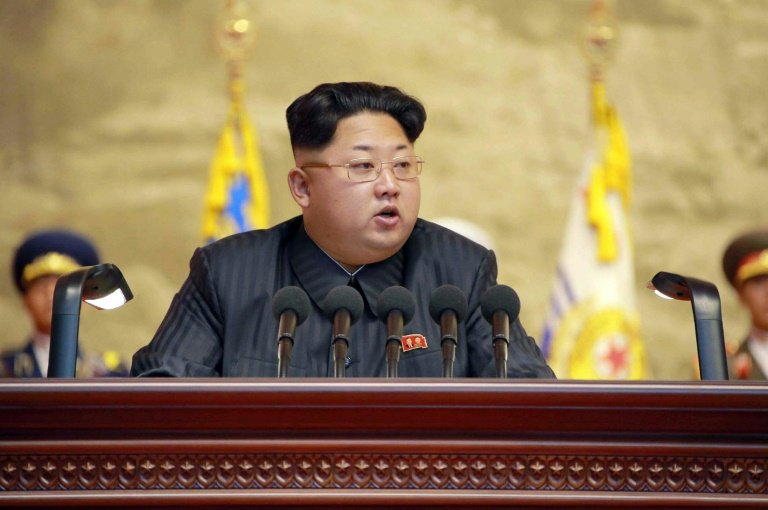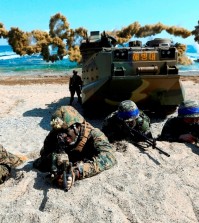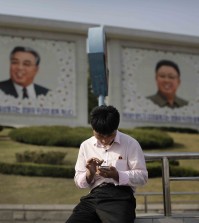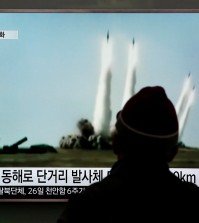- California Assembly OKs highest minimum wage in nation
- S. Korea unveils first graphic cigarette warnings
- US joins with South Korea, Japan in bid to deter North Korea
- LPGA golfer Chun In-gee finally back in action
- S. Korea won’t be top seed in final World Cup qualification round
- US men’s soccer misses 2nd straight Olympics
- US back on track in qualifying with 4-0 win over Guatemala
- High-intensity workout injuries spawn cottage industry
- CDC expands range of Zika mosquitoes into parts of Northeast
- Who knew? ‘The Walking Dead’ is helping families connect
N. Korea shows commitment to honoring inter-Korean deal

North Korean leader Kim Jong-un delivers a speech at the 4th national conference of war veterans, in Pyongyang, on July 25, 2015. (Yonhap/KCNA)
SEOUL (Yonhap) — North Korea has shown a rare public commitment to upholding its agreement with South Korea in sharp contrast to the communist regime’s trademark bellicose actions and language.
The inter-Korean deal, reached Tuesday after marathon talks, defused tensions that had been building over the Aug. 4 land mine attack and the ensuing artillery shelling, both blamed on the North.
It also laid the groundwork for improving Seoul-Pyongyang ties with a deal to push for temporary reunions of families separated by the Korean War nearly six decades ago and increase civilian exchanges.
Hours after the agreement was announced, North Korea’s chief delegate, Hwang Pyong-so, appeared on state television and expressed relief that the two sides had created a new mood of improving bilateral ties through joint efforts.
However, some questioned the sincerity of his remarks as he also appeared to deny the North’s responsibility for the land mine explosion that maimed two South Korean soldiers.
A key element of the agreement had been North Korea’s expression of “regret” over the incident, which South Korea has said is the equivalent of an apology by international standards.
On Thursday, the other North Korean delegate Kim Yang-gon, who is in charge of inter-Korean ties, issued a less ambiguous statement in an interview with the North’s Korean Central News Agency.
“Based on the spirit of the urgent high-level contact between the North and South, we will work actively to improve North-South relations, in line with the aim and wish of our people,” he said.
The official also stressed the importance of maintaining the current mood to move inter-Korean ties toward reunification.
Pyongyang’s message was clearer still when leader Kim Jong-un spoke highly of the agreement himself during an enlarged meeting of the Central Military Commission of the ruling Workers’ Party.
According to a KCNA report earlier Friday, Kim said the agreement should be “treasured” and developed to bear “abundant fruit.”
He also said the deal “provided a crucial landmark occasion of defusing the acute military tension and putting the catastrophic inter-Korean relations on the track of reconciliation and trust.”
Jang Yong-seok, a senior researcher for unification and peace issues at Seoul National University, noted the significance of such a public display of commitment.
“I expect the North will take aggressive steps to lead inter-Korean ties in line with the agreement,” he said.
Cheong Seong-chang, a senior researcher at the Sejong Institute, called on both Koreas to work for the implementation of the deal.
“In order for South-North ties to continue to sail smoothly, a strong will to improve ties on the part of both South and North will be essential,” he said.
Aside from the apology, the six-point deal included an agreement to halt South Korea’s anti-Pyongyang loudspeaker broadcasts along the border, hold further talks between the two sides, and lift North Korea’s “semi-state of war,” which had been declared at the peak of tensions last week.
Although it’s unclear why the North has suddenly reverted to peace gestures, some have cited the North’s growing economic and political isolation as a possible reason.















